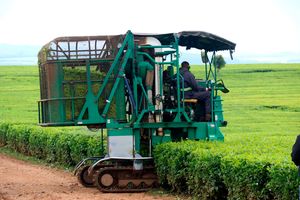
Workers arrange various types of teas for laboratory testing.
The Mombasa Tea Auction is poised for a major change as the industry looks to abandon the traditional method of tasting tea by mouth with the introduction of laboratory testing for tea quality.
Since the inception of the Mombasa Tea Auction, which dates back to colonial times, tea tasting has been a hectic process involving experts with tea tasting skills to determine the quality of the beverage.
If you visit the East Africa Tea Trade Association (EATTA) centre in Mombasa, you will usually find about 10 people queuing up on Mondays and Tuesdays, days before the auction, to determine the quality of the tea with their tongues.
Different types and categories of tea are lined up in small cups and a taster takes a sip of each, swirls it around his mouth and spits into a giant steel spittoon.
Mr John Waki, one of the tasters, says it's a process he uses to prepare for scheduled weekly tea auctions.
“One has to test all the packages presented prior auction day to determine the quality of the tea which will ultimate determine the price of the beverage,” said Mr Waki.
In the tongue tasting process, tasters say that good tea is supposed to be bright and each leaf has a different flavour.
A good taster can actually tell the difference between each and every cup.
But with the introduction of scientific tea tasting, tongue tasting is set to end the traditional way of tasting tea, which has been in existence since colonial times.
Agriculture Principal Secretary (PS) Kipronoh Ronoh said the Tea Board of Kenya (TBK) is setting up a tea quality laboratory to serve as a scientific tea tasting centre to replace the old system as tea volumes increase.
“The laboratory will use technology to determine the quality and flavour of tea being sold to end the tiresome process of tongue tea tasting. Numbers of tea volumes are increasing and quality tea determination will have to change with time,” said Dr Rono.
He was speaking after inaugurating the panel of judges for the 66th Tea Classes Competition, which is held annually to evaluate the leaf, infusion, liquor, cup appearance and aroma of black CTC and specialty teas produced in Kenyan factories.
Over 863 samples submitted by 71 factories managed by the Kenya Tea Development Agency (KTDA) - Holdings Limited, independent producers and estates will be judged over three days by six professional, accredited and experienced tea tasters.
The outstanding factories will be awarded, while the poor performers will be enrolled in a capacity building programme to improve their quality.
This competition aims to improve the quality of Kenyan tea. TBK is also establishing a Tea Quality Laboratory to serve as a scientific tea tasting centre.
The competition is coordinated by the TBK, while the judges are nominated by the East African Tea Trade Association. The judging sessions will be hosted by Combrok Ltd.
The introduction of the new tea tasting method comes barely a year after the Mombasa Tea Auction decided to abandon the decades-old open outcry system that had propelled it to the top of the international tea scene, and replace it with a fully electronic auction.
The online tea auction was designed to increase efficiency and raise Mombasa's already high profile in the tea world. But the change has swept away decades of tradition, and some fear the city isn't ready for such a dramatic shift.
East Africa's tea industry dates back to 1903, when a European settler planted the first bush in Kenya. Although 62 percent of the region's tea is still grown by smallholders, the auction now sells more black tea each year than any other auction house in the world.
Kenya exports more black tea than any other country in the world. East African tea is traditionally auctioned in the port city of Mombasa, and the Mombasa Tea Auction may be one of the last places where old world manners still prevail.









